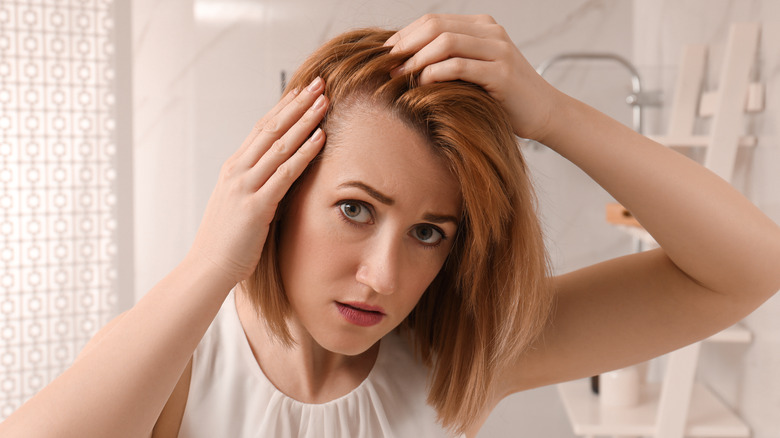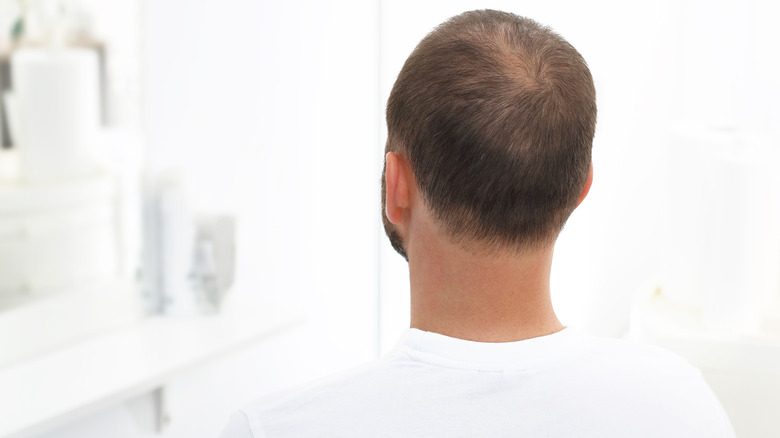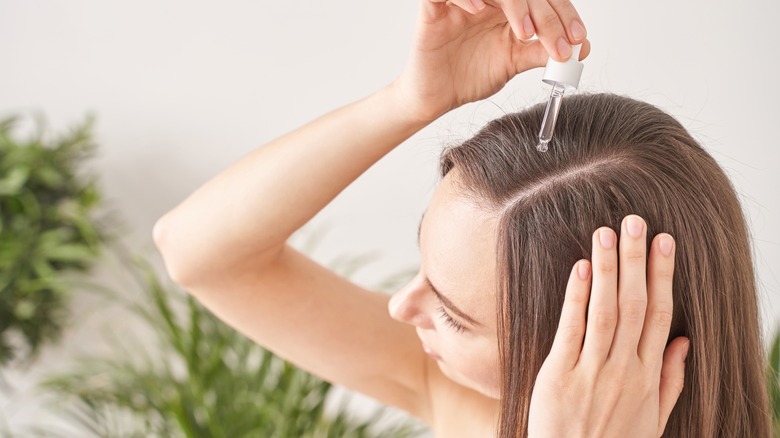The Anti-Aging Ingredient That Can Fight Thinning Hair, According To A Dermatologist
In the makeup and beauty world, people often repurpose products for different uses. You'll see face powder applied as eyeshadow and lipstick dabbed on cheeks. This trend has also made its way into the realm of skincare, where tretinoin, a vitamin A derivative known for its acne treatment and anti-aging properties, has found a new purpose. According to dermatologists on TikTok (and content creators who have jumped on the bandwagon), tretinoin can also work its magic when applied to areas of the scalp with thinning hair. They claim that it promotes hair growth by accelerating skin cell turnover rate and smoothing the skin, much like how it combats wrinkles.
Dermatologists have recommended tretinoin, which is essentially a more concentrated form of retinol, for various issues such as sun damage and dark spots. However, tretinoin requires a prescription from a healthcare provider and cannot be purchased over the counter like retinol. If you already have this anti-aging product in your medicine cabinet and have seen the TikTok videos about using tretinoin for hair loss, you may have considered getting the best of both worlds by using it on your hairline. Board-certified dermatologist Dr. Andrea Suarez, MD, FAAD acknowledges the potential of tretinoin for hair loss but advises keeping certain factors in mind before taking the plunge.
The studies on tretinoin and hair loss focus on androgenetic alopecia
According to Dr. Andrea Suarez, there are various types of hair loss, but the studies conducted on the anti-aging ingredient tretinoin and its relation to thinning hair have mainly focused on androgenetic alopecia. Suarez further pointed out the limited scale of these studies, with many of them being small and one even involving gerbils instead of human subjects.
A 2019 study on androgenetic alopecia published in Dermatologic Therapy indicated that the most effective approach for hair regrowth might involve the combined use of tretinoin and minoxidil. Minoxidil is a common ingredient used in treatments for certain types of baldness, such as androgenic alopecia. As trichologist Helen Reavey explained to Refinery29, "If you don't have androgenic alopecia, minoxidil has no purpose." Ultimately, hair thinning can be caused by numerous factors, and what works for one person may not work for everyone.
Additionally, if you have used retinol for skincare to address acne or anti-aging concerns, you may be aware that it can cause irritation and sensitivity, particularly at the start of your regimen. Tretinoin, which can lead to side effects like burning, peeling, redness, skin irritation, and dryness, should only be used under the guidance of a doctor (per Mayo Clinic). Suarez also mentioned that minoxidil can irritate the skin. Therefore, combining tretinoin and minoxidil on your hairline to prevent thinning may result in increased irritation and could even cause irritant contact dermatitis.
Try tretinoin but speak with your dermatologist first
When using tretinoin to treat thinning hair, it is recommended by dermatologists to conduct a patch test on a small area or slowly introduce the product if you already have it at home. Consulting with a dermatologist before starting the treatment is also a good idea. If you are purchasing tretinoin for the first time, you will need to see a healthcare provider to obtain a prescription anyway.
You should also consider the pH level of your scalp, which protects hair follicles. Cosmetic dermatologist Dr. Michele Green suggests checking if the tretinoin you are using is safe for scalp application (via InStyle). Again, ask a dermatologist to be sure. "The scalp should maintain a pH between 3.5 to 5.5. Products that are too alkaline deplete the scalp of its natural oils and can make the scalp too dry," said Green. If you are already undergoing a hair loss or skincare treatment recommended by a healthcare professional, you should consult with them before trying this DIY hack. Additionally, it is important to remember that the use of SPF is crucial when applying tretinoin to the skin, and the same applies if you were to use it on your scalp.



